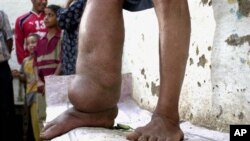BANGKOK —
Inexpensive bed nets treated with insecticide may hold the key to eradicating a debilitating disease that threatens one-fifth of the world's population - mainly those living in Southeast Asia and Africa.
Scientists say they have been able to demonstrate that the most common cause of the tropical disease elephantiasis can be virtually eradicated - even in lieu of medication - if those at risk sleep under nets treated with chemicals that kill mosquitoes.
Lisa Reimer, a lecturer at the Liverpool School of Tropical Medicine, was part of the team in Papua New Guinea studying progress over several years in eliminating the disease, caused by tiny worms most frequently injected into people by mosquitoes.
Reimer tells VOA she was surprised at how effective anti-malaria bed nets laced with insecticide could be at combating lymphatic filariasis - whose most horrifying symptom, elephantiasis, is the massive swelling of skin and tissue.
"Filariasis is only picked up by mosquitoes late in the evening, so this is the time when people are more likely to be protected by their bed nets. So we found that bed net use actually is a greater barrier against filariasis transmission whereas malaria transmission may still be occurring outside the times when the user is under the net," said Reimer.
Reimer is the lead author on a paper about the findings, being published in the New England Journal of Medicine.
The team involved researchers from institutes in Papua New Guinea, the United States, the United Kingdom and Australia.
Reimer says mass annual administration of drugs to residents of five villages in Papua New Guinea nearly eliminated the parasite from humans but did not stop its transmission by mosquitoes.
"If we can reduce mosquito-biting rates then we're able to increase the thresholds below which the disease prevalence will move to zero. So by controlling mosquitoes we're making the targets for the mass drug administration more obtainable," she said.
The World Health Organization (WHO) has a goal of eliminating lymphatic filariasis as a public health problem by the year 2020.
The treated nets block female mosquitoes from securing blood, which is essential for them to produce offspring. The insecticide also cuts in half the insect's life span, preventing the parasite from being transmitted.
The WHO estimates that 120 million people suffer from lymphatic filariasis. About one-third of those have been disfigured or debilitated by the disease. Infection is usually acquired in childhood but the profound visible manifestations become evident later in life.
Scientists say they have been able to demonstrate that the most common cause of the tropical disease elephantiasis can be virtually eradicated - even in lieu of medication - if those at risk sleep under nets treated with chemicals that kill mosquitoes.
Lisa Reimer, a lecturer at the Liverpool School of Tropical Medicine, was part of the team in Papua New Guinea studying progress over several years in eliminating the disease, caused by tiny worms most frequently injected into people by mosquitoes.
Reimer tells VOA she was surprised at how effective anti-malaria bed nets laced with insecticide could be at combating lymphatic filariasis - whose most horrifying symptom, elephantiasis, is the massive swelling of skin and tissue.
"Filariasis is only picked up by mosquitoes late in the evening, so this is the time when people are more likely to be protected by their bed nets. So we found that bed net use actually is a greater barrier against filariasis transmission whereas malaria transmission may still be occurring outside the times when the user is under the net," said Reimer.
Reimer is the lead author on a paper about the findings, being published in the New England Journal of Medicine.
The team involved researchers from institutes in Papua New Guinea, the United States, the United Kingdom and Australia.
Reimer says mass annual administration of drugs to residents of five villages in Papua New Guinea nearly eliminated the parasite from humans but did not stop its transmission by mosquitoes.
"If we can reduce mosquito-biting rates then we're able to increase the thresholds below which the disease prevalence will move to zero. So by controlling mosquitoes we're making the targets for the mass drug administration more obtainable," she said.
The World Health Organization (WHO) has a goal of eliminating lymphatic filariasis as a public health problem by the year 2020.
The treated nets block female mosquitoes from securing blood, which is essential for them to produce offspring. The insecticide also cuts in half the insect's life span, preventing the parasite from being transmitted.
The WHO estimates that 120 million people suffer from lymphatic filariasis. About one-third of those have been disfigured or debilitated by the disease. Infection is usually acquired in childhood but the profound visible manifestations become evident later in life.





